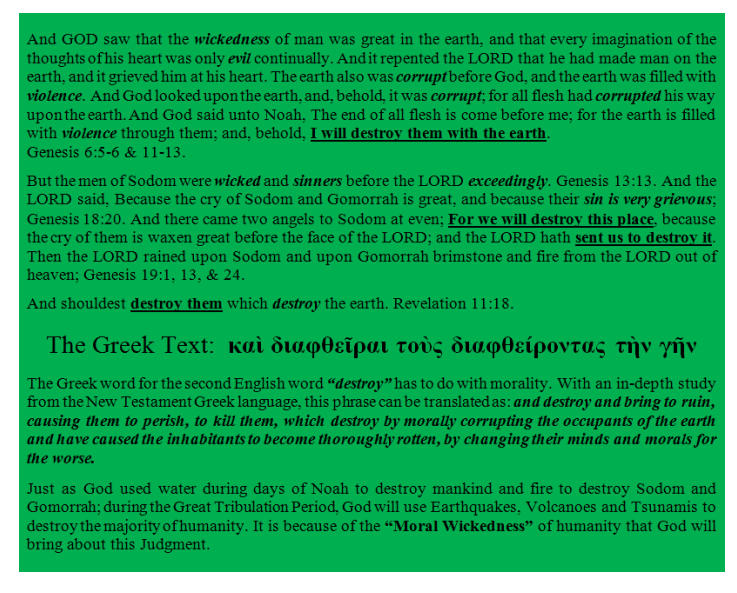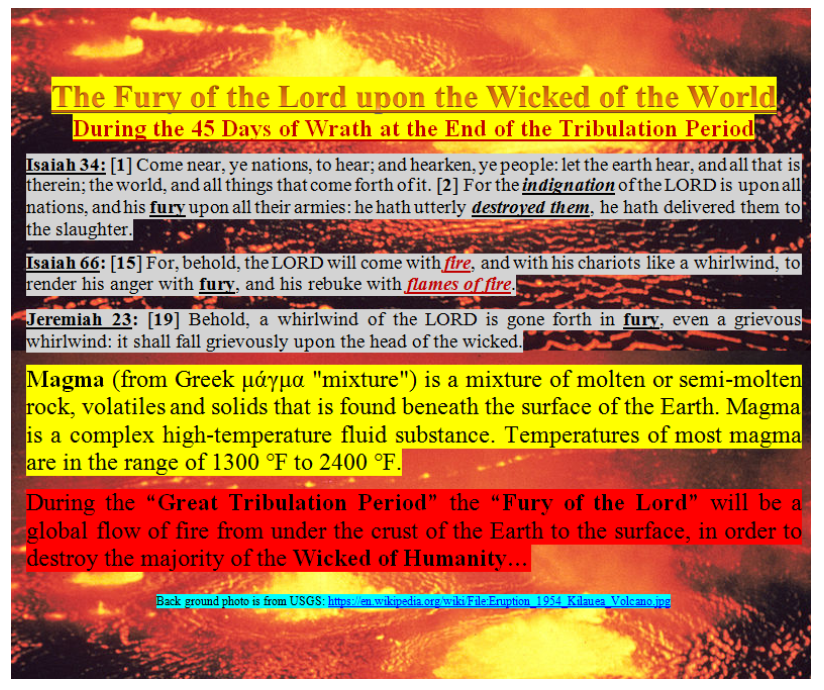Revelation 11:18 – And the nations were angry, and thy wrath is come, and the time of the dead, that they should be judged, and that thou shouldest give reward unto thy servants the prophets, and to the saints, and them that fear thy name, small and great; and shouldest destroy them which DESTROY the earth.


The Seventh Trumpet is about to sound… This the Catching Out of True Christian Believers.
Afterwards, the Seven Vials of the Wrath of God will take place. These event last for about a 45-day period. These events will destroy the majority of humanity and is mostly for the purpose of destroying the masses of humanity who are so morally corrupt, they are influencing the greater masses of people, that their minds and moral are changing for the worse and are becoming to the point of becoming thoroughly rotten!!!
The 7 Vials of the Wrath of God will be so great of a destruction, that the majority of humanity will be destroyed during this about a 45 day period, which will be the last portion of the 3 ½ years of the Great Tribulation Period, that perhaps only a few hundred million people will be allowed to enter into the Millennial Reign.
Greek word Number: 1311 diaphtheírō (from 1223 /diá, “thoroughly,” which intensifies 5351 /phtheírō, “defile, corrupt”) – properly, thoroughly corrupt, totally degenerate (disintegrate); waste away by the decaying influence of moral (spiritual) impurity; “utterly corrupt”; becoming thoroughly disabled (morally depraved), “all the way through” (“utterly decayed”).
Vine, Unger, White (NT, 130), “1311 (diaphtheírō) comes from dia, ‘through,’ ‘intensive,’ to corrupt utterly, through and through.” The noun form, 1312 (diaphthorá), likewise means “thorough decay.”
From diaballo and phtheiro; to rot thoroughly, i.e. (by implication) to ruin (passively, decay utterly, figuratively, pervert) — corrupt, destroy, perish. To change for the worse, to corrupt: minds, morals; τήν γῆν, i. e. the men that inhabit the earth, Revelation 11:18.
The purpose of the wrath of God will be to destroy those of humanity who have morally corrupted the earth. It is true, that all of humanity is corrupt to the core of their souls, but there are countless millions of people whose corruption has such an influence, that they are actually causing the billions of humanity to become even more morally corrupt by changing their minds for the worse, to the point of becoming thoroughly rotten!!!
(And should destroy them which destroy the earth.) The Greek word for the second English word “destroy” has to do with morality.
It can be translated as: and destroy and bring to ruin, causing them to perish, which destroy by morally corrupting the occupants of the earth and have caused them to become thoroughly rotten, by changing their minds and morals for the worse.
*****
The Lord Jesus Christ will return as the Parousia in bodily presence through this Volcanic Ash Cloud and begin His Millennial Reign. The Glory of the Brightness of His body will illuminate sufficiently to be refracted visibly surrounding the entire planet and every human will see Him upon His Return
The Great Tribulation Period will be composed of the 7 Trumpets and 7 Vials of the Book of Revelation. True Christian Believers will be on earth until the 7th Trumpet, in which case; whoever may survive the 1st thru 6th Trumpet, will be caught out on the 7th Trumpet. The Spiritually Lost human beings who survive the 7 Trumpets will have to endure the 7 Vials of the Wrath of God, which will last about 45 days. The majority of the population on earth will die during this Time Period, with perhaps only a few hundred million entering the Millennial Reign.
***
https://biblehub.com/parallel/revelation/11-18.htm
***
|
Revelation 11:18 ►
|
|
Modern Translations
New International Version New Living Translation English Standard Version Berean Study Bible New American Standard Bible NASB 1995 NASB 1977 Amplified Bible Christian Standard Bible Holman Christian Standard Bible Contemporary English Version Good News Translation GOD’S WORD® Translation International Standard Version NET Bible Classic Translations
King James Bible New King James Version King James 2000 Bible New Heart English Bible World English Bible American King James Version American Standard Version A Faithful Version Darby Bible Translation English Revised Version Webster’s Bible Translation Early Modern
Geneva Bible of 1587 Bishops’ Bible of 1568 Coverdale Bible of 1535 Tyndale Bible of 1526 Literal Translations
Literal Standard Version Berean Literal Bible Young’s Literal Translation Smith’s Literal Translation Literal Emphasis Translation Catholic Translations
Douay-Rheims Bible Catholic Public Domain Version Translations from Aramaic
Aramaic Bible in Plain English Lamsa Bible NT Translations
Anderson New Testament Godbey New Testament Haweis New Testament Mace New Testament Weymouth New Testament Worrell New Testament Worsley New Testament |
***
|
Revelation 11:18 ►
|
***
|
1311. diaphtheiró ►
|
|
Berean Strong’s Lexicon
diaphtheiró: To destroy, to corrupt, to ruin, to spoil
Original Word: διαφθείρω Word Origin: From the Greek preposition διά (dia, meaning “through” or “thoroughly”) and φθείρω (phtheiró, meaning “to destroy” or “to corrupt”). Corresponding Greek / Hebrew Entries: The Hebrew equivalent often associated with the concept of destruction or corruption is שָׁחַת (shachath, Strong’s H7843), which means to destroy, corrupt, or ruin. Usage: The verb διαφθείρω primarily conveys the idea of causing destruction or corruption. It can refer to physical destruction, moral corruption, or the spoiling of something that was once pure or whole. In the New Testament, it is often used in contexts that highlight the consequences of sin and the ultimate judgment of God against corruption. Cultural and Historical Background: In the Greco-Roman world, the concept of corruption was not only physical but also moral and societal. The term διαφθείρω would have been understood in a broad sense, encompassing the decay of moral values, the destruction of physical structures, and the spoiling of relationships. In the biblical context, it often underscores the contrast between the holiness of God and the fallen state of humanity. HELPS Word-studies
1311 diaphtheírō (from 1223 /diá, “thoroughly,” which intensifies 5351 /phtheírō, “defile, corrupt”) – properly, thoroughly corrupt, totally degenerate (disintegrate); waste away by the decaying influence of moral (spiritual) impurity; “utterly corrupt”; becoming thoroughly disabled (morally depraved), “all the way through” (“utterly decayed”). [Vine, Unger, White (NT, 130), “1311 (diaphtheírō) comes from dia, ‘through,’ ‘intensive,’ to corrupt utterly, through and through.” The noun form, 1312 (diaphthorá), likewise means “thorough decay.”] NAS Exhaustive Concordance
Word Origin Thayer’s Greek Lexicon
STRONGS NT 1311: διαφθείρω διαφθείρω; 1 aorist διεφθειρα; passive (present διαφθείρομαι); perfect participle διεφθαρμενος; 2 aorist διεφθαρην; the Sept. very often for שִׁחֵת, occasionally for חִבֵּל; in Greek writings from Homer down;1. to change for the worse, to corrupt: minds, morals; τήν γῆν, i. e. the men that inhabit the earth, Revelation 11:18; διεφθαρμένοι τόν νοῦν, 1 Timothy 6:5 (τήν διάνοιαν, Plato, legg. 10, p. 888 a.; τόν γνώμην, Dionysius Halicarnassus Antiquities 5, 21; τούς ὀφθαλμούς, Xenophon, an. 4, 5, 12). 2. to destroy, ruin, (Latinperdere); a. to consume, of bodily vigor and strength: ὁ ἔξω ἡμῶν ἄνθρωπος διαφθείρεται (is decaying), 2 Corinthians 4:16; of the worm or moth that eats provisions, clothing, etc. Luke 12:33. b. to destroy (Latindelere): Revelation 8:9; to kill, διαφθείρειν τούς, etc. Revelation 11:18. Strong’s Exhaustive Concordance
corrupt, destroy, perish.From diaballo and phtheiro; to rot thoroughly, i.e. (by implication) to ruin (passively, decay utterly, figuratively, pervert) — corrupt, destroy, perish. see GREEK diaballo see GREEK phtheiro |
***
|
Revelation 11:18 ►
|
|
NASB Lexicon
|
***
|
5351. phtheiró ►
|
|
Berean Strong’s Lexicon
phtheiró: To destroy, to corrupt, to spoil
Original Word: φθείρω Word Origin: Derived from a primary root related to the idea of corruption or destruction. Corresponding Greek / Hebrew Entries: – 7843 (שָׁחַת, shachath): To destroy, to corrupt – 2254 (חָבַל, chabal): To act corruptly, to spoil Usage: The Greek verb “phtheiró” primarily conveys the idea of causing ruin or corruption. It is used in the New Testament to describe both physical destruction and moral or spiritual corruption. The term can imply a process of decay or degradation, whether it be of material objects, moral character, or spiritual integrity. Cultural and Historical Background: In the Greco-Roman world, the concept of corruption was often associated with moral decay and the degradation of societal values. Philosophers like Plato and Aristotle discussed corruption in terms of ethical and political decline. In the Jewish context, corruption was seen as a deviation from God’s laws and commandments, leading to spiritual and communal decay. HELPS Word-studies
5351 phtheírō (from phthiō, “perish, waste away”) – properly, waste away, corrupt (deteriorate); (figuratively) to cause or experience moral deterioration – i.e. decomposition (break-down), due to the corrupting influence of sin. [This root (pht-) literally means “waste away” (degenerate), “moving down from a higher level (quality, status) to a lower form.] NAS Exhaustive Concordance
Word Origin Thayer’s Greek Lexicon
STRONGS NT 5351: φθείρω φθείρω; future φθερῶ; 1 aorist ἐφθειρα; passive, present φθείρομαι; 2 aorist ἐφθάρην; 2 future φθαρήσομαι; (akin to German verderben); the Sept. for שִׁחֵת; (from Homer down); to corrupt, to destroy: properly, τόν ναόν τοῦ Θεοῦ (in the opinion of the Jews the temple was corrupted, or ‘destroyed’, when anyone defiled or in the slightest degree damaged anything in it, or if its guardians neglected their duties; cf. Deyling, Observations, sacrae, vol. ii, p. 505ff), dropping the figure, to lead away a Christian church from that state of knowledge and holiness in which it ought to abide, 1 Corinthians 3:17a; τινα, to punish with death, 1 Corinthians 3:17{b}; equivalent to to bring to want or beggary (cf. our ruin (A. V. corrupt)), 2 Corinthians 7:2; passive, to be destroyed, to perish: ἐν τίνι, by a thing, Jude 1:10; ἐν with a dative denoting the condition, ἐν τῇ φθορά αὐτῶν, 2 Peter 2:12 L T Tr WH. in an ethical sense, to corrupt, deprave: φθείρουσιν ἔθη χρηστά ὁμιλίαι κακαί (a saying of Menander (see ἦθος, 2), which seems to have passed into a proverb (see Wetstein at the passage; Gataker, Advers. misc. l. i. c. 1, p. 174f)), 1 Corinthians 15:33; the character of the inhabitants of the earth, Revelation 19:2; passive, φθείρομαι ἀπό τίνος, to be so corrupted as to fall away from a thing (see ἀπό, I. 3 d.), 2 Corinthians 11:3; φθειρόμενον κατά τάς ἐπιθυμίας (R. V. waxeth corrupt etc.), Ephesians 4:22. (Compare: διαφθείρω, καταφθείρω.) Strong’s Exhaustive Concordance
corrupt, defile, destroy.Probably strengthened from phthio (to pine or waste); properly, to shrivel or wither, i.e. To spoil (by any process) or (generally) to ruin (especially figuratively, by moral influences, to deprave) — corrupt (self), defile, destroy. |
***